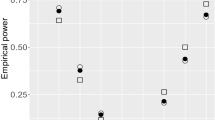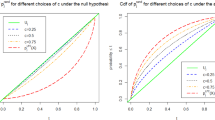Abstract.
Uniformly most powerful (UMP) tests are known to exist in one-parameter exponential families when the hypothesis H 0 and the alternative hypothesis H 1 are given by
(i) H 0 : θ≤θ0, H 1 : θ>θ0, and
(ii) H 0 : θ≤θ1 or θ≥θ2, H 1 : θ1<θ<θ2, where θ1<θ2.
Likewise, uniformly most powerful unbiased (UMPU) tests do exist when the hypotheses H 0 and H 1 take the form
(iii) H 0 : θ1≤θ≤θ2, H 1 : θ<θ1 or θ>θ2, where θ1<θ2, and
(iv) H 0 : θ=θ0, H 1:θ≠θ0.
To determine tests in case (i), only one critical value c and one randomization constant γ have to be computed. In cases (ii) through (iv) tests are determined by two critical values c 1, c 2 and two randomization constants γ1, γ2. Unlike determination of tests in case (i), computation of critical values and randomization constants in the remaining cases is rather difficult, unless distributions are symmetric. No straightforward method to determine two-sided UMP tests in discrete sample spaces seems to be known. The purpose of this note is to disclose a distribution independent principle for the determination of UMP tests in cases (ii) through (iv).
Similar content being viewed by others
Author information
Authors and Affiliations
Additional information
Received: March 1999
Rights and permissions
About this article
Cite this article
Scherb, H. Determination of uniformly most powerful tests in discrete sample spaces. Metrika 53, 71–84 (2001). https://doi.org/10.1007/s001840000095
Issue Date:
DOI: https://doi.org/10.1007/s001840000095




